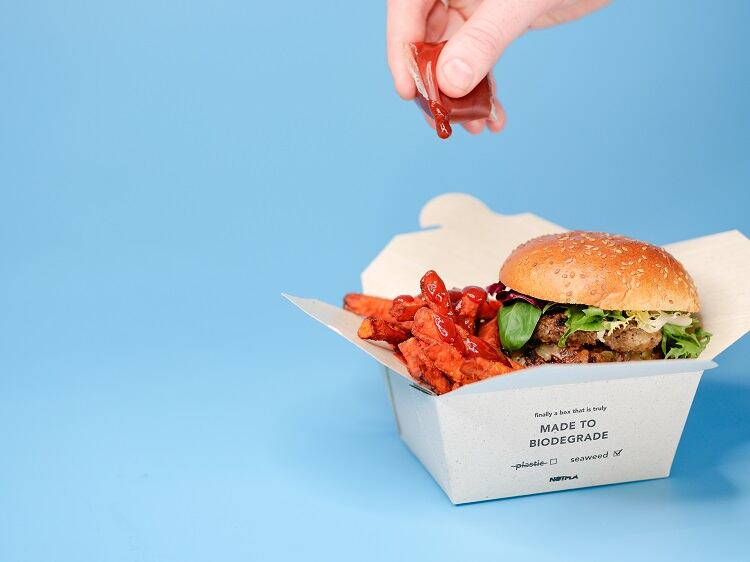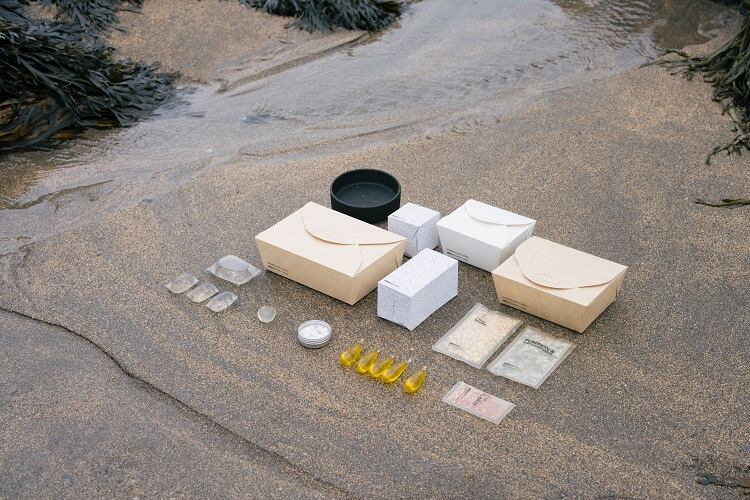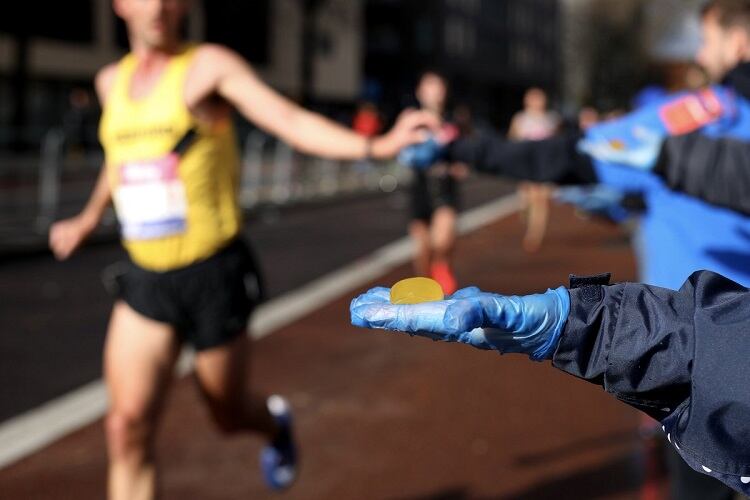Next year will mark alt plastic maker Notpla’s ten-year anniversary. Although not a new player to the packaging scene, Notpla (short for ‘not plastic’) has come a long way from the days of sitting around a kitchen ‘creating bubbles’.
“We started with intention and a little bit of magic in our kitchen,” recalled co-founder and co-CEO Pierre-Yves Paslier. What the packaging design engineer refers to as ‘bubbles’ were actually algae-based membranes capable of encapsulating water and other kinds of liquids. Notpla (then known as Skipping Rock Labs) coined the invention Ooho: an edible bubble designed to replace single use plastic packaging.
Over the last nine years Notpla has been expanding its portfolio to include takeaway food containers, rigid cutlery, spice sachets, and food oil pipettes, as well as applications for cosmetic and household cleaning products markets. All are made from seaweed and plants.
Seaweed packaging inspired by fruit
The impetus behind developing an alternative to single use plastic came from environmental concerns, explained Paslier at FoodNavigator’s recent Climate Smart Food digital summit.
Although plastic is a high-performance material, inexpensive and readily available, it is also inherently tied to plastic pollution. “The amount of plastic that [humans] pump into the ocean is starting to have complex implications for marine life. Microplanktons are eating more and more microplastics, which have a negative influence on their health – and eventually on the health of humans as well.”
On the hunt for alternatives to single use plastic, Notpla turned to nature for inspiration. Fruit peel, for example, naturally protects its contents while being completely biodegradable in the right environment. Unlike bioplastics, fruit peel doesn’t require any specific end-of-life human intervention to decompose, and some fruit casings – such as the skin on a cherry tomato – are completely edible.
“If we could design packaging a bit more like fruits, we [knew we] would have something really interesting,” recalled Paslier. That is, in part, the intention of Notpla, he continued, “to create packaging that can be literally edible, that you can consume just like a cherry tomato”.

In taking inspiration from nature, it is unsurprising Notpla’s solution is also sourced from nature. Seaweed is one of nature’s most renewable sources, said Paslier. Not only does it grow fast, but it also sequesters carbon as it grows. Further, there are lots of different species of seaweed, comprising lots of different properties. “We think that seaweed is incredible…And one of the incredible things about seaweed is that you can use it to create a range of different packaging solutions.”
From Ooho to the EarthShot Prize
Notpla’s first seaweed-based application, Ooho, was well received by consumers. With the ability to biodegrade in four to six weeks, or else consumed, the company trialled its innovations at sports events such as the London Marathon in 2019. One year prior, Lucozade Sport piloted the edible seaweed packaging – filled with its sports drinks and gels – at the Richmond Marathon and Tough Mudder sporting events.
On these occasions, Notpla was able to replace a ‘huge’ amount of plastic that typically would have been used in just one day, explained Paslier. “Now we’re working with Decathlon to replace [packaging of] its energy gels, so that [consumers] don’t have to use plastic and aluminium sachets.”
Ooho technology is also being used to create home compostable sachets for sauces, condiments and salad dressing for the food service industry.

Recently Notpla also made its mark in the takeaway food container space, having won the EarthShot Prize launched by Prince William to support solutions that ‘repair and regenerate the planet’.
Whereas conventional containers are lined with plastic coatings to protect against grease and moisture, the start-up has developed a biodegradable seaweed coating.
To make its boxes – of which Notpla has manufactured millions already – the company extracts ‘gelatinous elements’ from seaweed to develop a formulation for large-scale machinery. “It can then go through the rest of the normal chain of manufacturing at industry standard speed and create lots of different forms of boxes that be used in lots of different applications.”
Once used, the whole packaging can be composted. According to Notpla, worms, fungi and microbes love its invention: ‘Our containers become food for other living organisms’.
“We are now active in lots of stadiums around Europe,” Paslier added.
A ‘future proofing’ invention
From a business perspective, Notpla considers itself lucky to be operating at a time when legislative pressure around plastics is building.

In the UK, a Plastic Packaging Tax came into force last year, and a ban on single-use plastic bowls, plates and trays was enforced on 1 October. In the EU, Member States pay a plastic tax on non-recycled plastic waste, with some Member States introducing their own plastic taxes on single-use plastic packaging.
In November 2022, EU rules on Packaging and Packaging Waste were adopted. Regulators have defined ‘very clearly’ what does, and does not constitute plastic, explained Paslier. “We are…clearly out of the plastic category. [Businesses that use our products] are not going to face any of the bans or taxes that are being applied more and more to plastics.
“We are truly future-proofing, and helping brands switch away from plastic.”


